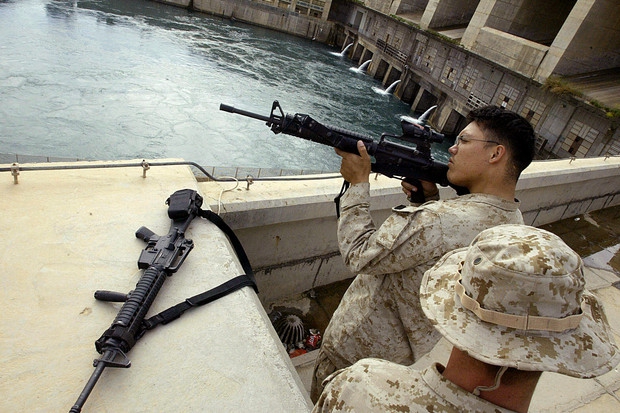 Photographer: Jaime Razuri/AFP via Getty Images
Photographer: Jaime Razuri/AFP via Getty ImagesIn this March 6, 2005 file photo, Third Batallion 25th Marines practice with their M-16 rifle from a viewing point on Haditha's dam, 250 kms from Baghdad.[/caption]
The U.S. expanded its air offensive in�Iraq by conducting strikes for the first time in the western part of the country to protect the Haditha Dam.
The new offensive, which began Sept. 6 using fighters and bombers, follows weeks of strikes around the Mosul Dam, which Islamic State militants had seized before ceding the territory to Iraqi and Kurdish forces.
In nine strikes over two days, the U.S. destroyed Islamic State Humvees and armed vehicles, along with a checkpoint and bunker, according to statements issued by U.S. Central Command in Tampa,�Florida.
The action in Iraq�s Anbar province is in support of Iraqi forces and Kurdish fighters seeking to reverse gains made by the insurgents, who have rampaged through OPEC�s No. 2 crude-oil producer since taking Mosul in June.
�The next phase is now to start going on some offense,� President�Barack Obama�said in an interview on NBC�s �Meet the Press.� Obama said that, in a speech on Sept. 10, he will �describe what our game plan�s going to be going forward� to confront Islamic State.
Islamic State retains key oil infrastructure in Iraq and eastern�Syria, generating millions of dollars in daily revenue to help fund a self-proclaimed caliphate, a state based on the group�s interpretation of Islamic law. The militants have used extortion and kidnapping to raise money and intimidate people as they expanded their territorial gains.
 Photographer: Safin Hamed/AFP via Getty Images
Photographer: Safin Hamed/AFP via Getty ImagesIraqi Peshmerga fighters stand on a tank as they hold a position on the front line in...�Read More
Humanitarian Missions
Obama has said the U.S. will continue airstrikes for the limited purposes of protecting U.S. personnel and humanitarian missions while awaiting the formation of a new Iraqi government. The president, who pressured former Iraqi Prime Minister Nouri Al-Maliki to step down, is seeking the speedy formation of a new, more inclusive government under Prime Minister-designate Haidar Al-Abadi as a stabilizing step for the region.
Iraq�s parliament will meet today to vote on a new cabinet, the office of the country�s parliament speaker said in a statement today. Abadi has until tomorrow to submit his cabinet to such a vote.
With U.S. military support, Iraqi and Kurdish forces have made some gains against fighters from the Islamic State. They seized control last month of the Mosul Dam on the Tigris River, the country�s biggest, and have prevented militants from seizing the Haditha Dam, the second-largest.
The two dams provide much of Iraq�s water and electricity. The Haditha Dam is on the Euphrates River in Anbar province, about 120 miles (193 kilometers) northwest of�Baghdad.
Sunni Tribes
�We conducted these strikes to prevent terrorists from further threatening the security of the dam, which remains under control of Iraqi security forces, with support from Sunni tribes,� Rear Admiral John Kirby, a Pentagon spokesman, said in a statement.
The U.S. has conducted 143 strikes since Aug. 7, when Obama authorized a return to military intervention in a conflict the nation had largely left behind more than three years ago.
�The potential loss of control of the dam or a catastrophic failure of the dam -- and the flooding that might result -- would have threatened U.S. personnel and facilities in and around Baghdad, as well as thousands of Iraqi citizens,� Kirby said.
�We need U.S. strikes, and we agreed to have them in the province,� Faleh al-Issawi, deputy head of Anbar�s provincial council, said in a phone interview, adding that a �wide military offensive� led by elite Iraqi forces had begun.
Ground Troops
The U.S. air offensive near Haditha is backed by Iraqi strikes and troops on the ground, General Anwar Ahmed Ameen, commander of Iraq�s air force, said by phone.
�Iraqi security forces are trying to push Islamic State fighters away from the dam and recapture all areas the group controlled,� the general said.
Islamic State insurgents have previously used water as a weapon, seizing a dam on the Euphrates near Fallujah and flooding some areas, forcing families from their homes and hampering the deployment of local forces.
In other fighting yesterday, a mortar attack injured Ahmed Khalaf al-Dulaimi, Anbar�s governor, and Abdul Hakeem al-Jeghaifi, chairman of Haditha city�s council, according to Khalid al-Hadithi, a municipal council official.
By Bloomberg
The Iran Project is not responsible for the content of quoted articles.











